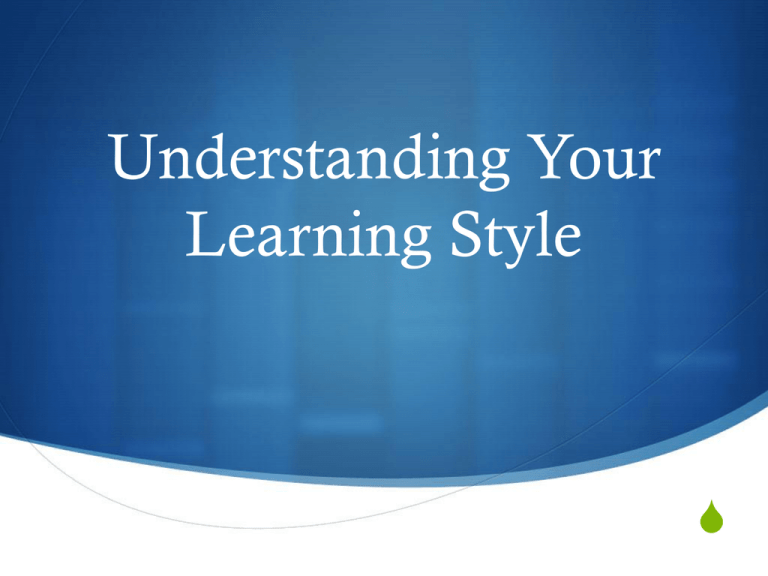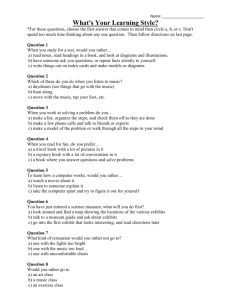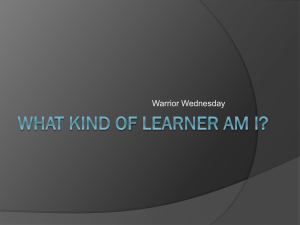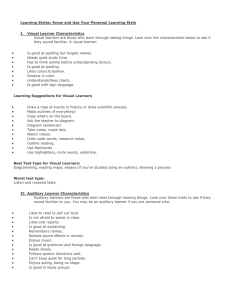Learning Styles - Catawba County Schools
advertisement

Understanding Your Learning Style S Types of Learning Styles Visual Learners S Typically learn by what they are able to see or visualize. S These individuals like to use visual aids such as maps, charts, diagrams, highlighted notes, and flashcards to help put the material in a better perspective. Visual Learners S Often, visual learners describe things in vivid detail using words to paint a picture. S They can process information better when instructions are written down rather than spoken out loud. Visual Learners Likes Dislikes • Reading • Lectures • Visual Aids • Discussions • Taking Notes • Music while Studying Auditory Learners S Typically are very good listeners and prefer hearing materials rather than reading it. S Individuals who have strong auditory processing skills absorb information better through sounds, music, classroom discussions, audio books, and verbal instructions. Auditory Learners S They are usually more talkative in class and enjoy participating in debates and discussions. S While they may struggle with reading, they are often skilled in music and foreign languages. Auditory Learners Likes Dislikes • Music • Writing • Lectures • Taking Notes • Discussions • Reading Kinesthetic Learners S Typically absorb information through the sense of touch, physical activity, and experimental projects. S These individuals prefer the hands-on approach to learning new things. Kinesthetic Learners S They may take notes in class or doodle on their paper but most often will not look at their notes again. S They tend to be touchers or feelers and will often stand close to someone when they are talking or touch that person on the arm or shoulder. S Also usually fidgety or like to have something in their hands, even if it’s just a pencil or paperclip. Kinesthetic Learners Likes Dislikes • Experiments • Lectures • Playing Instruments • Reading • Playing Sports • Sitting for a Long Time What Kind of Learner are You? Tips for Visual Learners S Use charts, maps, posters, and videos whenever possible to study. S Watch the person speaking and observe their body language and facial expressions. S It’s usually best to study alone in a quiet atmosphere. S Use colored highlighters to mark important notes and main ideas. Tips for Visual Learners S Write down information that you want to remember such as notes from the board or verbal instructions. S Ask for verbal instruction to be repeated for better understanding. S Rewrite key points or explanations that are difficult to recall. S Whenever possible use your own visual images to relate the topic being discussed. S Look over new material by scanning the pictures and titles/headings before reading. Tips for Auditory Learners S Read study materials, notes and other information out loud. S Study with a friend or in a small group. S Listen to audio books whenever possible. S Participate in class discussions. S Create rhymes to recall dates, names, facts, etc. Tips for Auditory Learners S Use word association techniques to memorize facts. S Ex. Proton = Positive, Neutron = Neutral S Use grid or graph paper to work on math problems. S Use colored highlighters to mark important notes & main ideas. Tips for Kinesthetic Learners S Get comfortable when studying. S Ex. Lounging in a chair or comfy couch S Listen to music while studying. S Take frequent breaks! S Listen to recorded notes & audio books while walking or exercising. Tips for Kinesthetic Learners S Demonstrate key study points by acting them out or miming to reinforce them in your memory. S Hold your book in your hands to read rather than placing it on a table. S If possible, draw a picture or create a model to clarify the material being studied. Tips for Kinesthetic Learners S Use flashcards and different types of board games to process and reinforce new information. S Stand up when called on in class to answer a question. S Use colored transparencies to read study materials. Learning Styles Experiment Pop Quiz 1. Name the 3 kinds of learning styles. 2. What’s one thing a Visual Learner likes? 3. What’s one thing a Kinesthetic Learner dislikes? 4. What percent of the population are Visual Learners? 5. State 3 tips for an Auditory Learner. Extra Ticket: What does reiterate mean?









